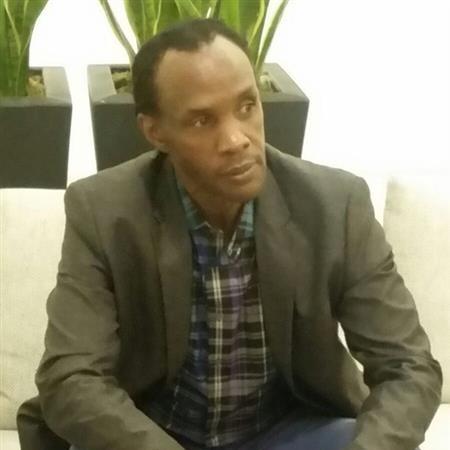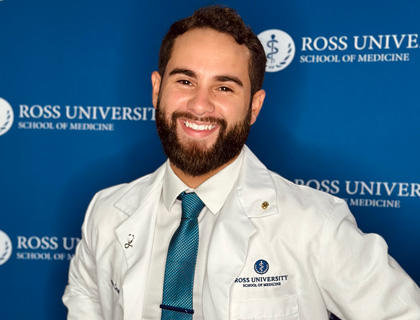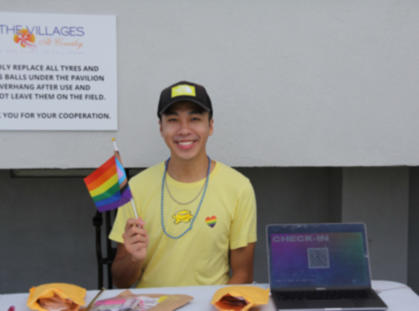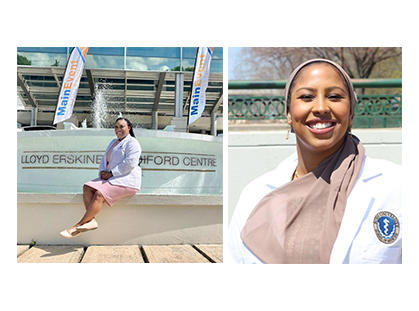Though he only joined Ross University School of Medicine (RUSM) 18 months ago, colleague Dexter Francis, MBA, MPM, has been woven into the fabric of the University since the early 2000s. And now, he is charged with one of the most prominent, critical and toughest tasks at hand — facilitating the newly formed 16-member Diversity & Inclusion Taskforce to ensure RUSM further embraces a truly inclusive culture and climate for students, faculty and colleagues as well as continues to graduate culturally aware physicians who mitigate social injustice for marginalized patients.
“We face many problems as a society, problems that we need to address as a community,” said the coordinator of campus programs in the Department of Student Affairs. “There are inequities and disparities in healthcare outcomes for underrepresented minorities. As individuals, we need to self-reflect, accept where we are and what we need to change, and commit to act. Forgiving and acknowledging is the way forward. I want Ross University to be the stellar example of a university with a body of colleagues who are the vanguard of social change, an example of true inclusiveness and a place where acceptance is a lived experience for everyone — a truly human institution.”
Plunging in to Help at RUSM
Joining Ross University in January 2019, Dexter aimed to improve campus programs and the student experience. “Higher education is a robust process that’s also selective. I wanted to find a way to positively impact students and create a socially conscious forum for discussing current important social issues and find ways to implement constructive, sustainable change.”
Dexter quickly began a deep dive into research, focusing on best practices for including diversity and inclusion in medical-education programs. He enrolled in the Association of American Medical Colleges’ (AAMC) Healthcare Executive Diversity and Inclusion Certificate (HEDIC) program, which provided a framework to successfully embed diversity and inclusion into culture, environment and curriculum. “We are using HEDIC to create a more comprehensive, deliberate and coordinated approach to diversity and inclusion at Ross University so everyone is treated equally, regardless of race and rank. We want to offer training for faculty and colleagues to ensure the best possible work environment. Research has long concluded that inclusive organizations are more innovative and creative, make better decisions and will attract talent.”
Fighting for Equal Footing
Born in England, Dexter’s mother sent him and his brother to the Caribbean to live with their grandparents when they were infants. While not confirmed, Dexter believes his mother wanted her boys to avoid racial discrimination overseas. She rejoined her sons years later and they migrated to Canada. Ever since, Dexter split time between Canada and Dominica, and is now settled in Barbados with his wife and periodic visits from their three grown children.
A social-work advocate for the underprivileged, Dexter’s mother spearheaded many youth organizations to provide adolescents with otherwise unattainable opportunities. Though she witnessed many inequities over the years, she wasn’t aware of the discrimination Dexter experienced at a young age. “I didn’t want to tell her because I was a little troublesome,” he said, sharing how his grade-school teacher would often send him into the hallway because of his skin color. “I judged myself as being the cause of the problem but over time, I came to realize it was an injustice — that I was no different than the other students and was just being mistreated by this one teacher.” Thankfully another teacher always welcomed Dexter into his classroom.
Finding Inner Peace
A social activist, sports fan, music enthusiast and poetry writer, Dexter is a spiritual being who meditates daily and enjoys family time. He is reserved and discounts small talk, preferring to engage in meaningful and objective discussions. “We only have one world to live in regardless of our geographic position on the Earth. We all need to be more accepting of each other. We’re all different colors, cultures, religions and races with different origins and different philosophies who all have the need to be treated with respect and dignity. With a shared mission, free from subjective bias and prejudices, we can all fully contribute to our institutional goals and mission, and to our society.”
Boasting a resume full of building design and construction management experience, Dexter once owned his own firm, which provided opportunities to work directly and indirectly on RUSM projects since the early 2000s. During that time, he also led the effort to revitalize football in Dominica. “I wanted to help turn it into an organization focused on the development of young people.” Playing the sport since a young age, Dexter remains active in Ross University’s intramural leagues and enjoys the camaraderie as well as the competitiveness.
Before joining Ross University, Dexter oversaw the project management team responsible for rebuilding the primary medical facility in Dominica. He and his team then worked double time after Hurricane Maria hit and the project parameters quickly changed. For two years, they worked alongside other local and overseas organizations to help restore the entire Dominica health-building infrastructure.
Though there are many challenges ahead, Dexter is inspired by the potential connectedness of the future. “Coming from the Caribbean, our experiences and scars may not be as deep or debilitating as African Americans but one senses microaggression from others. We have to raise our individual level of consciousness to keep moving forward and to correct social inequities, racism and all forms of injustice. We need to expose, through history, the fallacy of the kings, queens and the masses as the dispensable surfs — the manipulators of the system — who worked to serve their own ends and who played games to divide and mislead us. I would recommend that we all view the docufilm 13th, which demonstrates how systemic brainwashing plagued African Americans. We’re trying to enlighten individuals to the reality we all face. I am hopeful that we, humanely, will become aware of our shared space, our commonality and that we will recognize that we are stronger together.”
RUSM Diversity and Inclusion Taskforce
A group of 16 RUSM students, faculty, colleagues and alumni have begun leading a holistic review of diversity and inclusion at the University and will deliver a report of short- and long-term recommendations within the next three months. This is the first of many steps to sustain change.
As RUSM prepares to engage, train, educate, advocate and invest in this process to align for a truly diverse and inclusive community, we invite others to share feedback with us because we know the fight for social justice requires a collaborative community effort.




